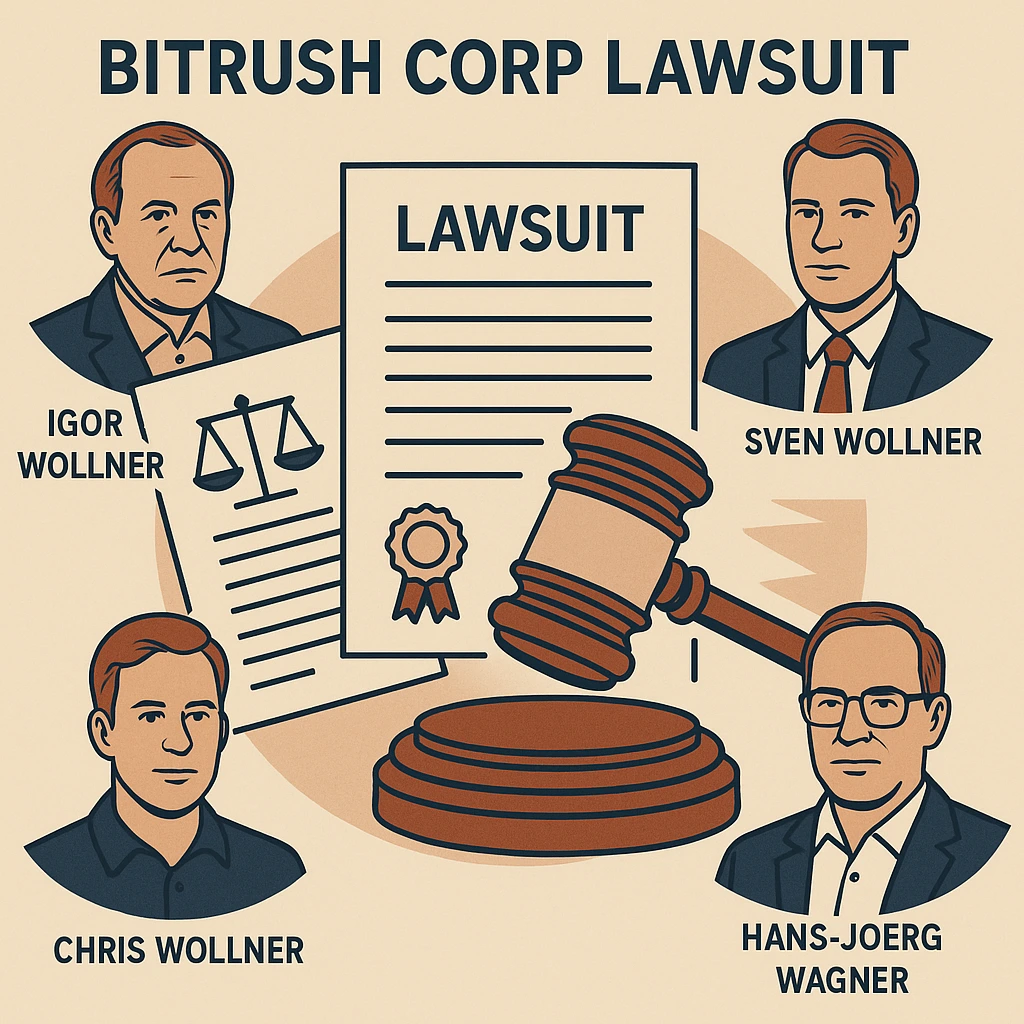Introduction: Lawsuit Finally Served in BitRush Case
After a lengthy delay of over 18 months, the lawsuit filed by the original founders of BitRush Corp has finally been formally delivered to the defendants. This case marks one of the earliest legal proceedings tied to a publicly-listed cryptocurrency company and addresses issues involving alleged money laundering and internal shareholder conflicts.
The defendants, including Slovak entrepreneur Igor WOLLNER and HSRC Investment Ltd, will now face legal scrutiny in a European court. This article outlines the background and current status of the dispute, shedding light on a pivotal chapter in early crypto history.
BitRush Corp: A Pioneer in Crypto Capital Markets
Founding and IPO
BitRush Corp was established in 2013 by the same individuals who later became involved in investigative efforts related to the crypto industry. The company sought to innovate in the blockchain space by developing a cryptographic clearing and payment platform, as well as a blockchain-driven advertising network.
Back when Bitcoin was still trading under $200, BitRush operated with developers and enthusiasts from Canada, Ukraine, and Russia. In 2015, the company went public through a Reverse Takeover (RTO) involving an existing mining entity. BitRush became one of the earliest crypto companies to be listed, with its shares traded on the Canadian Securities Exchange (CSE) and co-listed on the Frankfurt Stock Exchange.
Entry of the WOLLNER Family and HSRC Investment Ltd
In early 2016, Slovak investor Igor WOLLNER acquired a $500,000 stake in BitRush. His sons, Sven and Chris WOLLNER, joined the company’s leadership. Alongside Austrian investor Hans-Joerg WAGNER, they established HSRC Investment Ltd in Singapore to manage their interest in the company.
Binary Options, Veltyco, and the Shareholder Split
Proposed Deal with Veltyco
Toward the end of 2016, BitRush Corp explored a potential partnership with Uwe LENHOFF and the UK-listed VELTYCO GROUP LTD, aiming to expand its cryptographic payment services. A letter of intent was signed, envisioning payment flows up to $3 billion.
However, internal due diligence revealed that these volumes were largely tied to illegal operations—namely binary options (e.g., Option888), online betting, and lottery platforms like LottoPalace. These were run through offshore entities and widely considered fraudulent. Legal and accounting experts strongly advised the company against proceeding with the deal.
Founders’ Refusal and the Aftermath
The founding team refused to collaborate with LENHOFF and VELTYCO due to the reputational and legal risks. This proved to be the prudent decision, as binary options have since been outlawed in jurisdictions including Canada, the US, Israel, and across the EU. Multiple operators have faced criminal charges and imprisonment. Regulatory warnings had been issued against platforms like Option888 in the UK, Germany, Austria, and Italy. Recently, VELTYCO’s CEO Melissa BLAU also resigned amid the growing legal pressure.
Internal Conflict and Legal Maneuvering
Contrary to the founders’ position, the WOLLNERs and HSRC Investment pushed for cooperation with LENHOFF. Ignoring legal warnings, they engineered the removal of the founders from the company. According to court documents, this was achieved via affidavits containing false information in a Toronto court case, carried out without the founders’ participation. The founders rejected the Toronto court as a forum non conveniens — a legal doctrine allowing courts to decline jurisdiction if another forum is more appropriate (source). As a result, they did not appear in court, making it easier for the plaintiffs to strip them of their shares.
Legal Action by Founders
Civil and Criminal Complaints
The ousted founders responded by initiating a civil lawsuit against Igor WOLLNER and HSRC Investment in a European court. They also filed criminal complaints with European authorities, focusing on suspected money laundering practices linked to the defendants.
Evasion and Delay
For over a year and a half, the defendants successfully evaded the lawsuit. Local authorities in Slovakia were reportedly obstructed due to the WOLLNER family’s close political ties. HSRC’s website was taken offline, Wagner’s LinkedIn profile disappeared, and the WOLLNER family effectively went underground, adopting a stealth strategy to avoid legal action.
The Turning Point: Legal Process Moves Forward
After considerable delay, the lawsuit has now been officially served. The first court hearing is set for early January 2019. This litigation may become a landmark case, not just for BitRush Corp, but for the broader crypto community, addressing the dark undercurrents of money laundering and questionable transactions during the early years of cryptocurrency adoption.
Conclusion: A Defining Moment in Crypto Legal History
This legal conflict sheds light on the risks, internal power struggles, and ethical dilemmas that shaped some of the earliest crypto companies. Scam-or Project will continue to follow the developments in the BitRush case, offering insight into one of the most illustrative episodes in crypto’s formative years.


